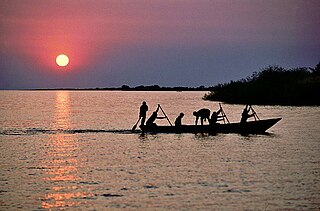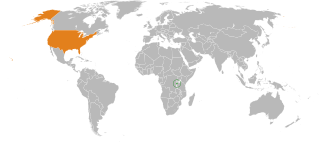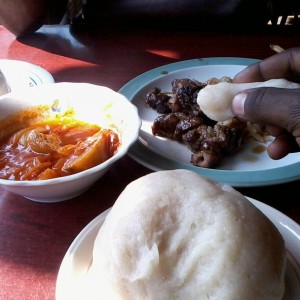| Full name | Le Messager Football Club de Bujumbura |
|---|---|
| Founded | 2005 |
| League | Burundi Premier League |
| 2017/18 | 13 th |
Le Messager FC de Bujumbura is a football club from Burundi. The team currently plays in Burundi Premier League.

The economy of Burundi is heavily dependent on agriculture, which accounts for 32.9% of GDP in 2008. Burundi itself is a landlocked, resource-poor country with an underdeveloped manufacturing sector. Agriculture supports more than 70% of the labour force, the majority of whom are subsistence farmers.

Burundi originated in the 16th century as a small kingdom in the African Great Lakes region. After European contact, it was united with the Kingdom of Rwanda, becoming the colony of Ruanda-Urundi - first colonised by Germany and then by Belgium. The colony gained independence in 1962, and split once again into Rwanda and Burundi. It is one of the few countries in Africa to be a direct territorial continuation of a pre-colonial era African state.

Bujumbura, formerly Usumbura, is the largest city and main port of Burundi. It ships most of the country's chief export, coffee, as well as cotton and tin ore. Bujumbura was formerly the country's capital. In late December 2018, Burundian president Pierre Nkurunziza announced that he would follow through on a 2007 promise to return Gitega its former political capital status, with Bujumbura remaining as economical capital and center of commerce. A vote in the Parliament of Burundi made the change official on 16 January 2019, with all branches of government expected to move to Gitega within three years.
The Hutu, also known as the Abahutu, are a Bantu ethnic or social group which is native to the African Great Lakes region of Africa. They mainly live in Rwanda, Burundi and the eastern Democratic Republic of the Congo, where they form one of the principal ethnic groups alongside the Tutsi and the Great Lakes Twa.

The president of Burundi, officially the President of the Republic, is the head of state and head of government of the Republic of Burundi. The president is also commander-in-chief of the National Defence Force. The office of the presidency was established when Michel Micombero declared Burundi a republic on 28 November 1966. The first constitution to specify the powers and duties of the president was the constitution of 1974 adopted in 1976. The constitution, written by Micombero, affirmed Micombero's position as the first president of Burundi. The powers of the president currently derive from the 2005 constitution implemented as a result of the 2000 Arusha Accords after the Burundian Civil War. The current president since 18 June 2020 is Évariste Ndayishimiye.

Burundi is divided into eighteen provinces, each named after their respective capital with the exception of Bujumbura Rural. The newest province, Rumonge, was created on 26 March 2015 from five communes previously belonging to the provinces of Bujumbura Rural and Bururi.

Gitega, formerly Kitega, is the capital of Burundi. Located in the centre of the country, in the Burundian central plateau roughly 62 kilometres (39 mi) east of Bujumbura, Gitega was the seat of the Kingdom of Burundi until its abolition in 1966. In late December 2018, Burundian president Pierre Nkurunziza announced that he would follow on a 2007 promise to return Gitega its former political capital status, with Bujumbura remaining as economic capital and centre of commerce. A vote in the Parliament of Burundi made the change official on 16 January 2019, with all branches of government expected to move in over three years.

This article lists the prime ministers of Burundi since the formation of the post of Prime Minister of Burundi in 1961 until the present day. The office of Prime Minister was abolished in 1998, and reinstated in 2020 with the appointment of Alain-Guillaume Bunyoni.

The Burundi national football team, nicknamed The Swallows, represents Burundi in international football and is controlled by the Football Federation of Burundi. The team has never qualified for the World Cup. Burundi previously did come very close to qualifying for the 1994 Africa Cup of Nations, losing only on penalties to Guinea in a playoff. However, in 2019, it qualified for the first time, and took part in the Africa Cup of Nations finals in Group B, but lost all its matches and left from the group stage without scoring a single goal.
The franc is the currency of Burundi. It is nominally subdivided into 100 centimes, although coins have never been issued in centimes since Burundi began issuing its own currency. Only during the period when Burundi used the Belgian Congo franc were centime coins issued.

The Kingdom of Burundi or Kingdom of Urundi was a Bantu kingdom in the modern-day Republic of Burundi. The Ganwa monarchs ruled over both Hutus and Tutsis. Created in the 17th century, the kingdom was preserved under European colonial rule in the late 19th and early 20th century and was an independent state between 1962 and 1966.
The Province of the Anglican Church of Burundi is a province of the Anglican Communion, located in East Africa between Tanzania, Rwanda, Kenya, and the Congo. The Archbishop and Primate of Burundi is Sixbert Macumi.

In 1962, the United States established diplomatic relations with Burundi when it gained its independence from Belgium. Following independence, the country experienced political assassinations, ethnic violence, and cyclical periods of armed conflict; several governments were installed through coups. The 2000 Arusha Peace and Reconciliation Agreement provided a negotiated settlement framework that, along with later ceasefire agreements, led to the end of the 1993-2006 civil war. President Pierre Nkurunziza's decision to seek a third presidential term in 2015 sparked protests in the capital and was followed by a failed coup d’état. The resultant violence and political and economic crises resulted in massive refugee flows to neighboring countries. The United States Embassy in Burundi's policy states: "The United States supports the achievement of long-term stability and prosperity in Burundi through broad, inclusive reconciliation; humanitarian assistance; economic growth; and the promotion of political openness and expansion of democratic freedoms. The United States supports the East African Community (EAC)-facilitated Burundian dialogue and other conflict resolution efforts within Burundi. The United States seeks to facilitate Burundi's deeper integration into regional and international markets, as a means to promote sustainable economic development."

Burundi, officially the Republic of Burundi, is a landlocked country in the Great Rift Valley where the African Great Lakes region and East Africa converge. It is bordered by Rwanda to the north, Tanzania to the east and southeast, and the Democratic Republic of the Congo to the west; Lake Tanganyika lies along its southwestern border. The capital cities are Gitega and Bujumbura, the latter of which is also the largest city.

Burundi is situated in East Africa and has a territory full of mountains, savannas and agricultural fields, with forests in the surrounding of rivers and waters. Agriculture is spread on 80% of the country's surface and it especially includes coffee, tea, corn, beans and manioc. Due to these characteristics, the Burundi cuisine is very representative of the African culinary culture, as it includes beans, which are the staple of Burundi cooking, exotic fruits plantains, sweet potatoes, cassava, peas, maize and cereals, like corn and wheat.
The COVID-19 pandemic in Burundi is part of the ongoing worldwide pandemic of coronavirus disease 2019 caused by severe acute respiratory syndrome coronavirus 2. The virus was confirmed to have reached Burundi on 25 March 2020.

General Évariste Ndayishimiye is a Burundian politician who has served as President of Burundi since 18 June 2020. He became involved in the rebel National Council for the Defense of Democracy – Forces for the Defense of Democracy during the Burundian Civil War and rose up the ranks of its militia. At the end of the conflict, he entered the Burundian Army and held a number of political offices under the auspices of President Pierre Nkurunziza. Nkurunziza endorsed Ndayishimiye as his successor ahead of the 2020 elections which he won with a large majority.

Alain-Guillaume Bunyoni is a Burundian politician who has been Prime Minister of Burundi since 23 June 2020. Before that, from 2015 until 2020, he served as Minister of Internal Security in the Cabinet of Burundi.
COVID-19 vaccination in Burundi is an ongoing immunisation campaign against severe acute respiratory syndrome coronavirus 2 (SARS-CoV-2), the virus that causes coronavirus disease 2019 (COVID-19), in response to the ongoing pandemic in the country. Burundi was one of the last nation states in the world to commence vaccination against COVID-19. This was mostly due to the government's refusal to vaccinate the population throughout most of 2021. In February 2021, Thaddee Ndikumana, the health minister of Burundi, said his country was more concerned with prevention measures. “Since more than 95% of patients are recovering, we estimate that the vaccines are not yet necessary,” local media reported.